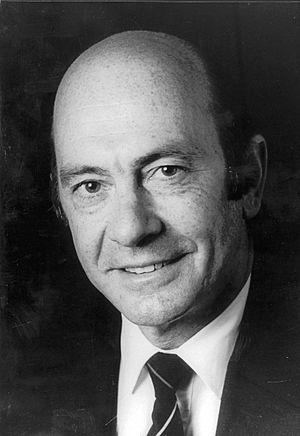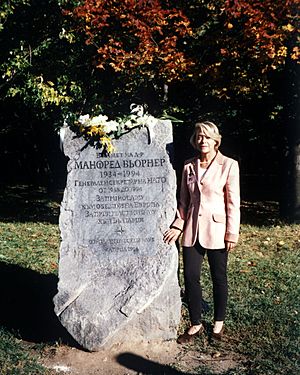Manfred Wörner facts for kids
Quick facts for kids
Manfred Wörner
|
|
|---|---|
 |
|
| 7th Secretary General of NATO | |
| In office 1 July 1988 – 13 August 1994 |
|
| Preceded by | The Lord Carrington |
| Succeeded by | Sergio Balanzino (acting) Willy Claes |
| Federal Minister of Defence (West Germany) |
|
| In office 4 October 1982 – 18 May 1988 |
|
| Chancellor | Helmut Kohl |
| Preceded by | Hans Apel |
| Succeeded by | Rupert Scholz |
| Deputy Chairman of the CDU/CSU Parliamentary Group in the Bundestag | |
| In office 20 October 1969 – 13 December 1972 |
|
| Member of the Bundestag | |
| In office 19 October 1965 – 30 June 1988 |
|
| Personal details | |
| Born |
Manfred Hermann Wörner
24 September 1934 Stuttgart, Germany |
| Died | 13 August 1994 (aged 59) Brussels, Belgium |
| Political party | Christian Democratic Union (CDU) |
| Spouses | Anna-Maria Casar (1972–1982) Elfrie Hartwig Reinsch (1982–1994) |
| Alma mater | University of Heidelberg University of Paris Ph.D. University of Munich |
| Profession | Diplomat |
Manfred Hermann Wörner (born September 24, 1934, in Stuttgart, Germany – died August 13, 1994, in Brussels, Belgium) was an important German politician and diplomat. He served as the defense minister for West Germany from 1982 to 1988. After that, he became the seventh Secretary General of NATO (North Atlantic Treaty Organization) from 1988 to 1994.
During his time as NATO Secretary General, major world events happened. These included the end of the Cold War and the German reunification. Even though he was diagnosed with cancer, he continued his work until his final days.
Contents
Family Life
Manfred Wörner grew up in his grandfather's home in Stuttgart-Bad Cannstatt. He went to the Johannes-Kepler-Gymnasium school there. He was married to Elfie Wörner, who supported many charities related to the German army. Elfie Wörner passed away in 2006.
Education and Early Career
After finishing school in 1953, Manfred Wörner studied law. He attended universities in Heidelberg, Paris, and Munich. He completed his law studies in 1957 and 1961. In 1961, he earned his Ph.D. in law, focusing on International law.
After his studies, he worked for the government of Baden-Württemberg. He served as a local official in Oehringen until 1962. Later, he worked for the Baden-Württemberg state parliament and in Göppingen county. Wörner was also a jet pilot and a reserve officer in the German Air Force (Luftwaffe).
Political Journey
Manfred Wörner was a member of the CDU political party in Germany. He was elected to the German parliament, representing the area of Göppingen.
On October 4, 1982, he became the Federal Minister of Defence in Helmut Kohl's government. Wörner played a key role in supporting NATO's decision to place intermediate-range missiles. This decision came after talks with the Soviet Union about reducing weapons. It aimed to balance the Soviet Union's earlier placement of its SS-20 missiles.
In 1983, Wörner faced a difficult situation involving German General Günter Kießling. The German military intelligence wrongly accused Kießling of something that was considered a security risk at the time. Wörner ordered Kießling's early retirement. However, it was later found that the accusation was a case of mistaken identity. Kießling fought to clear his name and was eventually put back in his position. Wörner took responsibility for the mistake and offered to resign in May 1984, but Chancellor Helmut Kohl did not accept his resignation.
Leading NATO (1988-1994)
In December 1987, the 16 member countries of NATO chose Manfred Wörner to be their Secretary General. He was the first German person to hold this important position. He left his job in the German government and started his new role on July 1, 1988.
In 1990, Wörner gave a speech that later became a topic of discussion. Years later, in 2007, Vladimir Putin mentioned this speech. Putin used it to suggest that NATO had promised not to expand its reach eastward after the Cold War ended.
Manfred Wörner continued his duties as NATO Secretary General even while battling a serious illness. He passed away from colorectal cancer in 1994. He is buried in the cemetery of Hohenstaufen, near Göppingen.
Personal Life
Manfred Wörner married Anna-Maria Caesar in December 1972. From 1982 until his death, he was married to Elfie Wörner, whose maiden name was Reinsch.
The Manfred Wörner Medal
Since 1996, the German Ministry of Defense has given out the Manfred Wörner Medal every year. This medal honors public figures who have done "special meritorious service to peace and freedom in Europe."
Some people who have received this medal include:
- 1996 Richard Holbrooke, a US diplomat
- 1997 Ewald-Heinrich von Kleist-Schmenzin, who started the Munich Conference on Security Policy
- 1998 Dr. Gerd Wagner (after his death), for helping with the Dayton Agreement
- 1999 Dr. Janusz Onyszkiewicz, Minister of Defense of Poland
- 2000 Elizabeth Pond, an American journalist
- 2001 Karsten Voigt, a German coordinator for German-American cooperation
- 2002 Javier Solana, the EU's foreign policy chief and former NATO Secretary General
- 2003 Prof. Dr. Catherine McArdle Kelleher, from the U.S. Naval War College
- 2005 Hans Koschnick
- 2006 Christian Schwarz-Schilling
- 2007 Martti Ahtisaari
- 2009 Jörg Schönbohm
- 2011 Hans-Friedrich von Ploetz, a German diplomat
See also
 In Spanish: Manfred Wörner para niños
In Spanish: Manfred Wörner para niños
- Manfred Wörner Seminar
- Manfred Wörner Foundation
- NATO Declassified - Manfred Wörner (biography)
Honours and Recognitions
The Manfred Wörner Seminar is named after him. This seminar helps young leaders from Germany, the United States, and other European countries learn about security policy. It honors Wörner's efforts to improve understanding between countries on both sides of the Atlantic Ocean.
Wörner Gap, a place on Livingston Island in Antarctica, is also named after Dr. Wörner. This is to recognize his important work towards uniting Europe.
 | Laphonza Butler |
 | Daisy Bates |
 | Elizabeth Piper Ensley |


